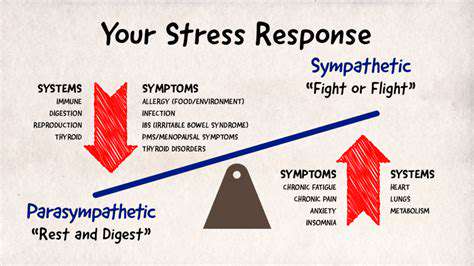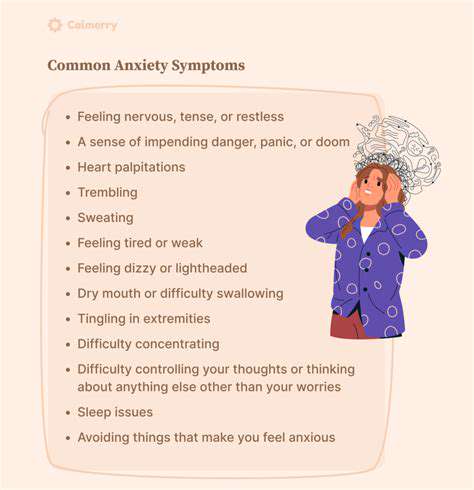Shortness of Breath at Night: Anxiety's Role Explained
The Connection Between Anxiety and Nocturnal Dyspnea
Understanding Nocturnal Dyspnea
Nocturnal dyspnea, or shortness of breath that occurs at night, is a common symptom that can significantly impact a person's quality of life. It's often a signal that something is amiss within the body, and can range from relatively benign causes to serious underlying medical conditions. Understanding the nuances of this condition is crucial for proper diagnosis and treatment.
While many factors can contribute to nighttime breathing difficulties, it's important to recognize that anxiety can be a significant player in exacerbating or even triggering these episodes. Recognizing the interplay between mental and physical health is key to effective management.
Anxiety's Impact on Breathing
Anxiety disorders are characterized by excessive worry, fear, and apprehension. These feelings can manifest physically in various ways, including increased heart rate, rapid breathing, and a tightening sensation in the chest. This physiological response can disrupt the natural rhythm of breathing, particularly at night when the body is attempting to rest and restore.
The heightened state of alertness associated with anxiety can lead to hyperventilation, where the body takes in more air than it needs. This can disrupt the balance of oxygen and carbon dioxide in the blood, potentially contributing to feelings of breathlessness, especially during sleep.
Underlying Medical Conditions
While anxiety can certainly contribute to nocturnal dyspnea, it's essential to remember that other medical conditions can also be responsible. Heart conditions, such as congestive heart failure, can cause fluid buildup in the lungs, making it difficult to breathe at night. Chronic lung diseases like asthma and COPD can also manifest as nighttime breathing problems.
Other potential causes include sleep apnea, where breathing repeatedly stops and starts during sleep, and certain infections or allergies. Proper medical evaluation is crucial to identify the root cause of nocturnal dyspnea, distinguishing between anxiety-related issues and other potential medical concerns.
Anxiety-Induced Nocturnal Dyspnea
Anxiety can create a vicious cycle regarding nocturnal dyspnea. The discomfort of shortness of breath at night can intensify feelings of anxiety and fear, further exacerbating the breathing problems. This cycle can be challenging to break without appropriate intervention.
Recognizing the connection between anxiety and breathing difficulties is the first step toward managing this issue. Talking to a doctor about concerns related to both mental and physical health is essential for developing a personalized treatment plan that may include therapy, medication, or lifestyle adjustments, and potentially addresses both the anxiety and the shortness of breath.
Managing Anxiety and Nocturnal Dyspnea
Effective management of both anxiety and nocturnal dyspnea often requires a multifaceted approach. Techniques such as deep breathing exercises, progressive muscle relaxation, and mindfulness practices can help calm the mind and body, reducing the physiological response to anxiety. Cognitive behavioral therapy (CBT) can provide tools for managing anxious thoughts and behaviors.
In addition to psychological strategies, addressing underlying medical conditions is crucial. A doctor can help determine if other factors are contributing to the shortness of breath and recommend appropriate treatments. Lifestyle modifications, such as regular exercise, a balanced diet, and sufficient sleep, can also play a significant role in reducing both anxiety and the likelihood of experiencing nocturnal dyspnea.


Seeking Professional Help and Management Strategies

Understanding the Need for Professional Support
Seeking professional help for mental health concerns is a courageous and important step. It signifies a commitment to self-improvement and acknowledges that sometimes, navigating challenges alone can be overwhelming. Recognizing that you need support is a sign of strength, not weakness. It takes significant self-awareness and vulnerability to admit you need assistance.
Many people struggle with feelings of isolation and shame when facing mental health difficulties. However, seeking professional guidance is a proactive way to address these issues and develop coping mechanisms. Professional therapists can offer a safe and confidential space to explore these feelings without judgment.
Identifying Potential Barriers to Seeking Help
Several obstacles can prevent individuals from seeking professional mental health support. These may include financial constraints, lack of awareness about available resources, or concerns about confidentiality and stigma. Addressing these barriers is crucial for promoting mental well-being within the community.
It's also important to acknowledge that cultural factors and personal experiences can influence an individual's willingness to seek professional help. Addressing these nuances is vital in creating a supportive environment for everyone.
Exploring Types of Professional Help
A range of professionals can provide valuable support for mental well-being. Psychologists, psychiatrists, social workers, and counselors offer different approaches and expertise. Each professional has unique training and focuses on various therapeutic modalities to help individuals address their needs.
Navigating the Process of Finding a Professional
Finding a suitable mental health professional can be a process. Factors such as location, insurance coverage, and specific therapeutic approaches should be considered. Researching different professionals and reading reviews can help you find someone who aligns with your needs and values. Taking the time to find a suitable match is essential for a positive therapeutic experience.
Don't hesitate to reach out to friends, family, or your primary care physician for recommendations. They may have valuable insights into professionals who have helped others effectively.
The Importance of Open Communication
Open communication with your chosen professional is essential for a successful therapeutic journey. Be honest and transparent about your experiences, concerns, and goals. This open dialogue fosters a strong therapeutic alliance and facilitates progress.
Building a Support System
Building a strong support system is crucial for navigating mental health challenges. This includes maintaining relationships with friends and family who offer encouragement and understanding. Connecting with others who share similar experiences can provide a sense of community and belonging. Consider joining support groups or finding online communities focused on mental well-being.
Seeking help is a positive step towards personal growth and well-being. It demonstrates strength and resilience in the face of adversity.